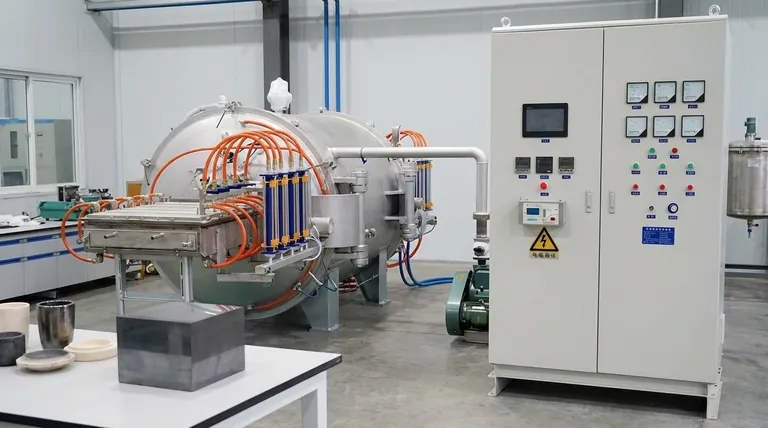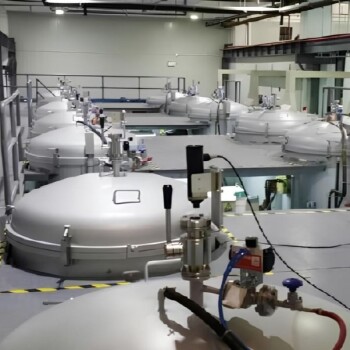En esencia, el grafito es un material de dualidades. Es mecánicamente robusto, extremadamente rígido y mantiene su forma bajo una tensión significativa, lo que lo convierte en una opción potente para aplicaciones estructurales. Sin embargo, esta rigidez conlleva una contrapartida crítica: también es frágil y puede astillarse o fracturarse por impactos bruscos.
El valor del grafito reside en su excepcional rigidez y estabilidad dimensional, lo que permite diseños robustos y eficientes. El principal desafío para cualquier ingeniero es diseñar teniendo en cuenta su fragilidad inherente para prevenir fallos por impacto o carga de choque.

La base: Rigidez y estabilidad dimensional
La estructura atómica del grafito le confiere una combinación única de propiedades. Su rigidez es fundamental para su rendimiento en entornos industriales exigentes, como los componentes de hornos.
Rigidez excepcional
El grafito es muy rígido, lo que significa que resiste la flexión y la deformación cuando se aplica una carga. Un componente como un solado de horno hecho de grafito no se hundirá ni cambiará de forma bajo cargas pesadas.
Retención de la forma a largo plazo
Esta rigidez se mantiene con el tiempo. Los componentes de grafito pueden mantener su forma precisa casi indefinidamente, mostrando muy poca fluencia o distorsión incluso después de un uso prolongado a altas temperaturas.
El beneficio: Alta robustez mecánica
Esta resistencia y estabilidad inherentes se traducen directamente en importantes ventajas de diseño y operativas. Los ingenieros aprovechan la robustez del grafito para crear sistemas más eficientes y productivos.
Permitiendo un diseño eficiente
Dado que el grafito es tan fuerte, los diseños a menudo pueden hacerse más pequeños y con menos complejidad. Se necesitan menos sistemas de soporte de fijación, lo que simplifica la ingeniería general y reduce los costes de material.
Soportando mayores capacidades
La capacidad de utilizar componentes más pequeños y resistentes permite un uso más eficiente del espacio. En un contexto de fabricación, esto conduce directamente a la capacidad de procesar lotes más grandes, aumentando el rendimiento y la productividad.
Comprender las compensaciones: Fragilidad
El factor más crítico a considerar al trabajar con grafito es su falta de ductilidad. Aunque es muy fuerte, no es tenaz.
La limitación clave: Fragilidad
La principal debilidad mecánica del grafito es su fragilidad. A diferencia de los metales, que se doblarán o deformarán antes de romperse, el grafito tiende a fracturarse repentinamente cuando se supera su límite elástico.
Susceptibilidad al impacto
Esta fragilidad hace que los componentes de grafito, como los raíles de solado, sean propensos a astillarse o agrietarse durante la manipulación o transferencia de cargas. Un impacto brusco puede provocar un fallo catastrófico que un material más dúctil absorbería fácilmente.
Tomar la decisión correcta para su aplicación
Implementar con éxito el grafito requiere una comprensión clara de sus fortalezas y debilidades en el contexto de su objetivo específico.
- Si su enfoque principal es la integridad estructural y la estabilidad: La rigidez del grafito y la retención de la forma a largo plazo lo convierten en una excelente opción para fijaciones, solados y otros componentes que no deben deformarse bajo carga.
- Si su enfoque principal es el alto rendimiento y la eficiencia: Aproveche la robustez del grafito para crear diseños más pequeños y sencillos que permitan lotes más grandes y una mayor productividad.
- Si su aplicación implica un posible impacto o choque: Debe diseñar protecciones para tener en cuenta la fragilidad del grafito, ya que no soportará golpes bruscos sin astillarse o fracturarse.
Comprender este equilibrio entre una inmensa rigidez y una fragilidad inherente es la clave para desbloquear todo el potencial del grafito en sus diseños.
Tabla de resumen:
| Propiedad | Característica | Consideración clave |
|---|---|---|
| Rigidez | Extremadamente alta, resiste la flexión y la deformación. | Permite diseños robustos y sencillos con menos soporte. |
| Estabilidad dimensional | Excelente retención de la forma a largo plazo, incluso a altas temperaturas. | Ideal para fijaciones y componentes que requieren precisión. |
| Resistencia | Alta robustez mecánica bajo carga. | Permite componentes más pequeños y mayores capacidades de procesamiento. |
| Fragilidad | Baja tenacidad a la fractura, propenso a astillarse por impacto. | Requiere una manipulación y un diseño cuidadosos para prevenir fallos por choque. |
Optimice sus procesos a alta temperatura con los materiales adecuados
Comprender las propiedades mecánicas precisas del grafito es crucial para diseñar sistemas eficientes y fiables a alta temperatura. El equilibrio entre su rigidez excepcional y su fragilidad inherente debe gestionarse cuidadosamente para tener éxito.
KINTEK se especializa en equipos de laboratorio y consumibles de alto rendimiento, incluidos componentes de grafito de primera calidad para aplicaciones exigentes. Ofrecemos la experiencia en materiales y los productos fiables para ayudarle a:
- Diseñar para la estabilidad: Aproveche la rigidez del grafito para fijaciones, solados y soportes que no se hundirán ni deformarán.
- Maximizar el rendimiento: Utilice su resistencia para construir sistemas eficientes con mayores capacidades.
- Mitigar el riesgo: Obtenga orientación experta sobre manipulación y diseño para protegerse contra fallos frágiles.
Hablemos de cómo las soluciones de grafito adecuadas pueden mejorar la eficiencia y la productividad de su laboratorio. ¡Contacte con nuestros expertos hoy mismo para una consulta!
Guía Visual

Productos relacionados
- Horno Continuo de Grafización al Vacío de Grafito
- Horno de grafización al vacío a ultra alta temperatura de grafito
- Horno Vertical de Vacío de Grafito de Alta Temperatura para Grafización
- Horno de Grafización de Película de Alta Conductividad Térmica de Vacío de Grafito
- Horno de Grafización Experimental de Vacío de Grafito IGBT
La gente también pregunta
- ¿Cuáles son los beneficios de la pirólisis de plásticos? Convirtiendo residuos en combustible y materia prima valiosos
- ¿Cómo se mantiene una temperatura constante en un laboratorio? Domine el control térmico de precisión para obtener resultados fiables
- ¿Qué tipo de horno se utiliza en el laboratorio? Calentamiento de precisión para la exactitud científica
- ¿Qué precauciones de seguridad debe tomar al trabajar con una fuente de calor? Directrices esenciales para un entorno de laboratorio seguro
- ¿Para qué se utiliza un horno de laboratorio? Una guía para un calentamiento, esterilización y secado precisos
- ¿Cómo logra un sistema de reacción de calentamiento controlado el control de la morfología de las nanopartículas de platino?
- ¿Cuál es el efecto de la temperatura de sinterización en la densidad? Dominando el equilibrio para propiedades óptimas del material
- ¿Cómo funciona un horno de cinta continua durante el recocido de electrodos de Pt? Escalando el rendimiento catalítico



















